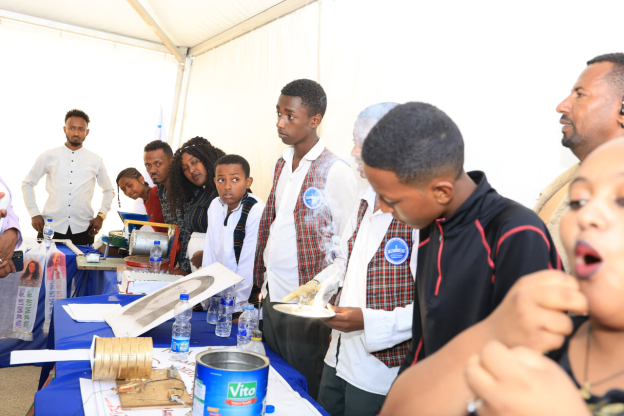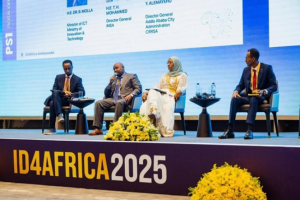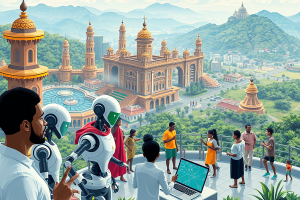
Yoseph Mohamed is a teacher at Mezgebe Berhan School found in Addis Ababa’s Lideta Sub city. During the 10th Addis Ababa’s city-wide Teachers’ and Students’ Science and Innovation Exhibition, organized under the theme “”A Diligent Generation Rooted in Innovation for National Prosperity,” last week, Yoseph presented his block-making machine created and designed at school. He produced the machine after he realized the cost of building houses and his intention is to reduce the cost of building a house and secondly, to reuse plastic wastages in producing block.
Speaking to Ethiopian Press Agency, Yoseph said that the idea was first initiated to become exemplary for his students to solve own-problems by innovating new solutions. “I started the work as a teacher to become a role model to my students to teach and initiate them to solve problems they face by their own through creating problem-solving innovations and by practically apply the theories they leant in school,” he said. According to the teacher, the machine produces eco-friendly plastic assembled houses by comprising and molding various waste materials commonly found in the area, plastic bottles, TV and tape covers and other materials.
“It took me five days to finalize the machine and the machine was produced from thrown metal and wood materials,” Yoseph said adding the machine is helpful for environmental protection in addition to its main goal to the construction sector. For Yoseph, schools should become centers of innovation by translating the theoretical works in to practical products so as to build innovative, creative and technologically active generation. And for him, teachers should lead their students to become creative and innovative by teaching laboratory-based practical education and by become their role models in innovation and technology sector.
Another exhibitor at the 10th City-wide Students’ and Teachers’ Science and Innovation Exhibition was Fuad Gabi. Fuad is a grade 4 student at the Kilinto Number-2 Elementary School. He designed and produced a motorcycle by his own capacity. Innovation is his childhood dream and his hobby and he is trying translating his ideas into practical products. Fuad wants to own a motorcycle and finally he tried to make his own motorcycle.
Approached by EPA, Fuad said that, the motorcycle is designed with comfort and easily manageable for children and he produced the motorcycle from dropped metals and the motorcycle uses dynamo. The motorcycle has the capacity of covering 12 kilometers within an hour and it has remote controller, the student reiterated. “As the motorcycle uses remote controller, it make it unique from other motorcycles,” he added. For Fuad, he already has prepared a manual how to ride the motorcycle and he envisions working on it to see the product in the market in the near future.
As to Fuad, as we are in the era of technology and innovation, students should focus on practical solutions and innovations for their own personal development as well as to help their nation. The school based laboratories and practical education coupled with the theoretical class can enhance students’ ability and cultivate their talents in innovation and technology sectors. For Fuad, school-based science and innovation focused exhibitions and competitions would enhance and promote talents of the youth generation and he suggested schools and education offices to expand such exhibitions, tournaments and other platforms to promote school-based innovation, technological creativity and talents.
Speaking at the concluding ceremony of Addis Ababa’s 10th Students’ and Teachers Science and Innovation Exhibition, Addis Ababa Education Bureau head Zelalem Mularu (PhD) said that city’s education bureau is investing on young innovators to shape Ethiopia’s scientific feature. With a bold strategy to fostering a generation of innovators and scientists capable of positioning Ethiopia as a leading force in Africa’s science and innovation landscape, the Addis Ababa Education Bureau is working on nurturing creativity and technical skills among young people.
According to Zelalem, the city’s education bureau aims at cultivating a generation that will transcend today’s challenges and elevate Ethiopia’s status on the international stage with innovative and scientific solutions. Applauding the outstanding creative projects presented by students and teachers during the exhibition, Zelalem said that “these are evidences that the seeds of tomorrow’s scientific leadership are already being planted.”
Zelalem stated that the three-day exhibition which showcased practical innovations developed by students and educators demonstrated that Ethiopia’s future innovators are gaining the skills and mindset needed to drive national progress. For him, a strong focus on science and innovation is critical if Ethiopia is to compete globally across multiple sectors and schools are the bases to build sustainable and effective professionals. To realize the nation’s vision in the technology, science and innovation sectors, Zelalem calls strong participation of families, educators, and other stakeholders for the effectiveness and sustainability of such efforts. “The responsibility for nurturing the next generation of scientists does not rest on the schools alone,” Zelalem stated adding “families and the wider community must also encourage children to embrace creativity and critical thinking.”
For Zelalem, to enhance the spirit of competition in the innovation, technology and science fields is a tool for learning and self-empowerment of students. Appreciated the school-based projects displayed by students and teachers at the exhibition, Zelalem calls innovators to come-back next year with more developed innovative products and with innovation by next year.
(Participants of the Addis Ababa city-wide 10th Students’ and Teachers’ Science and Innovation Exhibition displaying their products to visitors at the Friendship Park)
Meanwhile, Addis Ababa has hosted the 14th edition of Africa’s leading education and technology summit, Innovation Africa Summit 2025, themed “Educate and Skill Africa for the 21st Century.” The three-day continental event, from April 28-30, was attended by delegates from 26 different countries on the continent, underlining the role of education and skills for the future of Africa.
Underlining the critical role of education in the continent’s sustainable development, speaking at the opening ceremony of the continental event, Deputy Prime Minister of Ethiopia, Temesgen Tiruneh, said that Africa should focus on equipping youths through empowering teachers and skilled students. According to Temesgen, Africa should transform the education sector through reform, capacity building, and integrating education with technology strategically. For him, the education sector should support the continent’s efforts in promoting and developing scientific skills, innovations, creativity, as well as local technological developments.
According to the Deputy Prime Minister, Ethiopia gives due attention to the development of education and skills development. Accordingly, Ethiopia is working on school construction, infrastructure improvement, digital network expansion, and placing special attention on innovation and skills enhancement to realize the national vision of prosperity. Advancing education, ICT, and skills across the African continent requires joint efforts among all stakeholders in the continent; Temesgen emphasized hoping the three-day continental event to create a platform to coordinate the continent’s stakeholders and to share experiences in enhancing innovative education in Africa.
For his part, Minister of Innovation and Technology (MINT), Belete Molla (PhD), during the summit said that Ethiopia is positioning itself as a hub for technology, innovation, and startups. According to Belete, both the private and the public sectors are working hand-in-hand for the development of technological innovations and startups. As to him, Ethiopia’s innovation economy is growing rapidly, and the nation’s efforts in building an ecosystem that accelerates innovation, local technological developments, and startups, especially, are following the national reform.
According to Belete, Africa’s future employment prospects for the young generation depend on the continent’s capacity to develop skills to compete in the international market. As to him, for the effectiveness and sustainability of innovation, technology, and startups development in Africa, it is critical to cultivate student potential through expanding STEM education and access to higher learning institutions on the continent. Belete underlines the need to invest in learning systems both to drive academic achievements and cultivate critical thinking, problem-solving skills, and innovation.
BY DARGIE KAHSAY
THE ETHIOPIAN HERALD FRIDAY 2 MAY 2025





